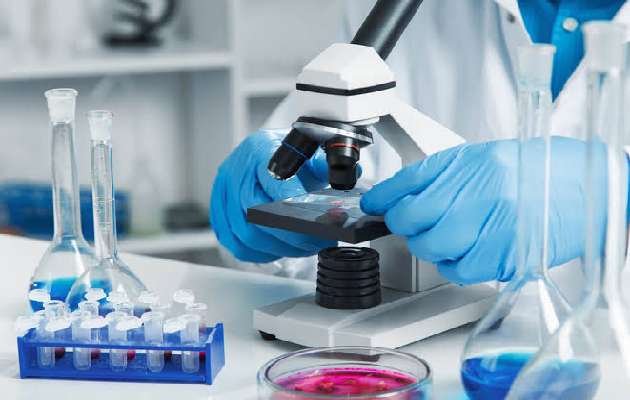


Clinical pathology plays a crucial role in disease diagnosis, treatment, and prevention by analyzing blood, urine, and other body fluids. At Biocheck Diagnostics And Polyclinic, we offer a comprehensive range of Clinical Pathology Tests to assess various health parameters and provide accurate diagnoses for effective treatment planning. Our advanced laboratory services ensure high-quality analysis and timely reporting.reproduction.
Clinical Pathology Test
Clinical pathology tests involve the examination of bodily fluids such as blood, urine, and tissue samples to diagnose diseases and assess overall health.
These tests provide crucial information regarding infections, metabolic disorders, organ function, and blood-related conditions. They are essential in guiding treatment decisions and monitoring disease progression.
Clinical Pathology Test

Preparation for clinical pathology tests varies based on the type of test. Common preparations include:
Your doctor or our team will provide specific instructions based on the test you need.
WHY CHOOSE Biocheck Diagnostics And Polyclinic
Our laboratory is led by a highly qualified M.D. Pathologist, ensuring that every test is interpreted with expert knowledge.
We use advanced technology and automated systems to ensure that your clinicalpathology results are accurate, reliable, and fast.
Our lab is staffed with highly trained and experienced hematologists and medical technologists who interpret and analyze your results with precision.
We prioritize your privacy. All test results are confidential and shared only with you and your healthcare provider.
At the heart of everything we do is our commitment to the patient.
We understand that healthcare costs can be a concern, which is why we offer affordable pricing for all of our Clinical Pathology tests.
What Biocheck Offers
Assesses creatinine levels in urine, often used in kidney function evaluation.
Compares blood and urine creatinine levels to estimate kidney filtration rate (GFR).
Comprehensive urine analysis to detect infections, kidney disorders, and metabolic conditions.
Detects protein in urine, indicating kidney disease or other systemic conditions.
Detects hidden blood in stool, indicating gastrointestinal bleeding or malignancies.
Rapid test to detect the presence of hCG hormone for pregnancy confirmation.
Analyzes joint fluid for infections, arthritis, and inflammatory conditions.
Evaluates cerebrospinal fluid for infections, neurological diseases, and bleeding.
Identifies respiratory infections by examining sputum for pathogens.
Assesses pleural fluid to diagnose infections, malignancies, and lung diseases.
Analyzes abdominal fluid for infections, liver disease, or malignancies.
KNOW ABOUT CLINICAL PATHOLOGY
Clinical pathology plays a vital role in diagnosing and monitoring a wide range of diseases that affect blood, metabolism, organ function, and the immune system. Various pathological conditions can be identified through laboratory analysis of blood, urine, and other bodily fluids, helping doctors provide timely and effective treatment.
Hematological disorders, including anemia, leukemia, and clotting abnormalities, are among the most common conditions diagnosed through clinical pathology. Anemia, caused by deficiencies in iron, vitamin B12, or chronic diseases, leads to fatigue, weakness, and pale skin, which can be detected through a Complete Blood Count (CBC) and iron studies. Leukemia, a cancer of the blood and bone marrow, is identified through blood smears and bone marrow biopsies, helping determine the type and severity of the condition. Clotting disorders, such as hemophilia and deep vein thrombosis (DVT), result from abnormalities in blood coagulation, which can be assessed through tests like Prothrombin Time (PT) and Activated Partial Thromboplastin Time (APTT).
Metabolic and endocrine disorders also fall under the scope of clinical pathology. Diabetes, a prevalent metabolic disorder, is diagnosed through fasting blood glucose, glucose tolerance tests, and HbA1c levels, which measure long-term blood sugar control. Thyroid disorders, including hypothyroidism and hyperthyroidism, are detected through Thyroid-Stimulating Hormone (TSH), T3, and T4 tests, helping assess whether the thyroid is underactive or overactive. Electrolyte imbalances, which can lead to dehydration, cardiac issues, or neurological symptoms, are identified through sodium, potassium, and chloride level assessments.
Liver and kidney diseases are commonly diagnosed through pathology tests that evaluate organ function. Liver diseases such as hepatitis, cirrhosis, and fatty liver disease are detected through Liver Function Tests (LFTs), which measure enzymes like ALT, AST, and bilirubin levels, indicating liver inflammation or damage. Kidney disorders, including chronic kidney disease (CKD) and infections, are diagnosed using Kidney Function Tests (KFTs), which assess creatinine and urea levels in the blood, along with urinalysis to detect protein or abnormal cells in the urine.
Infections and inflammatory diseases are also a major focus of clinical pathology. Bacterial and viral infections, such as tuberculosis, HIV, and urinary tract infections, are diagnosed using blood cultures, CRP (C-reactive protein), and procalcitonin tests, which help detect inflammation and immune responses. Autoimmune diseases, including lupus and rheumatoid arthritis, are identified through markers like Antinuclear Antibody (ANA) and Rheumatoid Factor (RF), which help confirm the presence of immune system dysfunction.
By analyzing blood, urine, and tissue samples, clinical pathology enables early detection of diseases and aids in their effective management. These tests provide crucial insights that help physicians diagnose conditions accurately, monitor disease progression, and determine the best treatment strategies for improved patient outcomes.
Clinical pathology tests play a crucial role in diagnosing, monitoring, and managing various health conditions by analyzing blood, urine, and other body fluids. These tests help detect infections, metabolic disorders, organ dysfunction, and hematological abnormalities, providing valuable insights into a patient’s overall health. Routine tests such as Complete Blood Count (CBC) assess red and white blood cell levels, hemoglobin concentration, and platelet count, aiding in the diagnosis of conditions like anemia, leukemia, and clotting disorders. Biochemical tests, including liver and kidney function tests, glucose tolerance tests, and lipid profiles, evaluate organ function and metabolic balance, helping to detect diseases like diabetes, liver disease, and kidney disorders.
Urinalysis is another essential clinical pathology test that examines the composition of urine to detect infections, kidney diseases, and metabolic conditions. Electrolyte tests measure levels of sodium, potassium, and chloride, which are critical for maintaining fluid balance and nerve function. Hormonal assessments, such as thyroid function tests and reproductive hormone panels, help diagnose endocrine disorders, infertility issues, and metabolic imbalances. Advanced pathology tests, including blood cultures and inflammatory markers like C-reactive protein (CRP), are used to identify infections and autoimmune diseases. By providing accurate and timely results, clinical pathology tests support healthcare providers in making informed treatment decisions, ensuring early intervention and effective disease management.
MAKE APPOINTMENTS